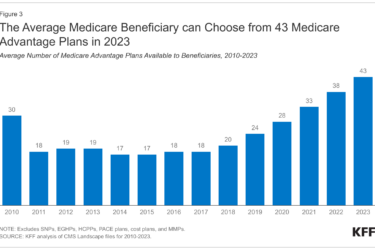Older Americans have a lot at stake as the Supreme Court considers the future of the Affordable Care Act, and it behooves reporters on the aging beat to understand this slice of the Health Policy debate.
Howard Gleckman gave a good overview recently on his “Caring for our Parents” blog. Gleckman is a former senior correspondent at Business Week, author of the book “Caring for Our Parents,” and a resident fellow at the Urban Institute.
Here’s a look at how older adults might be affected, drawing on Gleckman’s piece and my thoughts.
Medicare. As Gleckman notes, Health Policy offers an important benefit to seniors: an eventual end to the dreaded “doughnut hole” – the multi-thousand dollar gap in coverage for prescription drugs, available through Medicare Part D.
If the Supreme Court strikes down only the individual mandate component of the Affordable Care Act – the requirement that everyone carry insurance or pay a penalty – there’s no reason this provision couldn’t stand, except for its expense. If, however, the Supreme Court invalidates the entire Act, this benefit may well disappear, leaving many seniors vulnerable to high medication costs.
Since adults 65 and older already have coverage through Medicare, they wouldn’t be harmed if the court overturns key provisions expanding health insurance coverage to 30 million Americans. But uninsured adults in the 55 to 64 age group would be hard hit. As Families USA noted in a report:
“While people in this age range are currently the least likely to be uninsured, they can have very serious problems finding coverage if they leave or lose their jobs: They are too young for Medicare and too old to purchase affordable coverage on their own in the private individual market. Options for coverage outside the workplace are limited.”
It’s highly unlikely that Medicare will cancel new preventive services for seniors – a popular element of Health Policy that became effective in January 2011. Services now provided without beneficiary cost sharing include an annual wellness exam and screenings for diabetes, cognitive impairments, high cholesterol and cancer.
Medicaid. Health Policy would add up to 16 million new members to Medicaid, mostly poor children and adults under age 65. In terms of seniors, its biggest impact lies in two areas: a push to provide more long-term care services outside of institutions (see below) and a drive to better coordinate care provided to “dual eligibles” – sick, poor seniors covered by both Medicare and Medicaid.
A complete invalidation of the Affordable Care Act would hamper both initiatives by withdrawing legislative support and crucial funding. Both initiatives could survive a partial invalidation of the Act, but whether leadership for these changes would materialize is in question.
Home and Community-Based Care. For years, advocates have pressed for an expansion of long-term care services available to seniors outside of nursing homes. The Affordable Care Act recognized this and directed billions of dollars toward so-called “home and community-based services,” as Gleckman notes:
“The ACA includes important new incentives for states to expand Medicaid long-term care services for people living at home. Today, nursing homes still get the lion’s share of Medicaid long-term care dollars. Yet seniors and adults with disabilities overwhelmingly want to receive assistance at home. The ACA includes a number of new programs to expand those home and community-based programs, but all would die with the law.”
Gleckman is correct if the entire law is upended. But if only the individual mandate is rejected by the court, it’s likely this shift toward home and community-based care will persist, if only in a reduced form. The economics and preferences of aging baby boomers will require these changes to occur.
Integrated care. If Health Policy is torpedoed by the Supreme Court, many experts expect the government to continue testing innovative programs that improve medical care and lower costs. But several prominent Republicans have questioned the value of programs funded through the newly created Center for Medicare and Medicaid Innovation and appear poised to mount political attacks on its work.
Gleckman says that “In the long-run, perhaps the most important provisions for seniors are a far-reaching package of experiments aimed at improving the way care is delivered to people suffering from chronic disease, as nearly all seniors do. ” He predicts that these demonstration projects will end if Health Policy is struck down by the Supreme Court.
Other experts believe similar efforts to improve chronic care will be undertaken by the private sector if Health Policy fails.
Long-term care insurance. The CLASS Act, part of the Health Policy package, would have created the nation’s long-term care insurance program but that initiative fell by the wayside when the Obama administration decided that it was unaffordable. See AHCJ’s recent tip sheet on long-term care for more details.
Without this program, long-term care insurance will remain an unaffordable expense for many consumers, especially as insurers across the country sharply raise premiums.
This is a lot to assimilate, but here’s another thought: if Health Policy is deep sixed by the Supreme Court, it will be many years before Congress will be willing to undertake another substantial overhaul of the health care system, Gleckman suggests. That’s a sobering thought, since older adults’ health is frequently compromised by costly, sometimes unjustified, fragmented and uncoordinated care in the system we now have.
Related: Joanne Kenen, AHCJ’s topic leader on Health Policy, writes that there is still plenty to watch and report on as the Supreme Court deliberates.
 Judith Graham (@judith_graham), AHCJ’s topic leader on aging, is writing blog posts, editing tip sheets and articles and gathering resources to help our members cover the many issues around our aging society.
Judith Graham (@judith_graham), AHCJ’s topic leader on aging, is writing blog posts, editing tip sheets and articles and gathering resources to help our members cover the many issues around our aging society.
If you have questions or suggestions for future resources on the topic, please send them to judith@healthjournalism.org.









